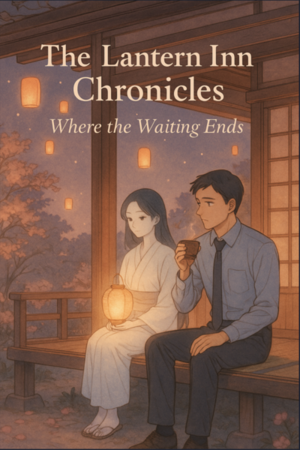Chapter 15:
The Lantern That Waited Too Long
Lantern Inn Chronicles
It had been one hundred and seven nights since Kaito Moriyama first arrived at the Lantern Inn — the place where time softened, where stories didn’t end but waited to be remembered.
In that time, thirteen rooms had been filled.
Thirteen lanterns, once dim, now glowed softly in the night.
One soul had returned to a past life — reborn not in body, but in memory, finally at peace with the echoes left behind.
Another had moved on — not in fear, but in quiet acceptance, as though the weight of unfinished stories had finally lifted from her shoulders.
One had chosen to stay — not trapped, but free — piecing together a life that had long crumbled under silence and grief, now rebuilding it with laughter, color, and forgiveness.
And Kaito?
He had guided them. All of them.
Not as a savior.
Not even always as a friend.
But as someone who listened.
Who sat with them when the silence was too loud.
Who asked the questions no one else dared to.
One by one, he had walked beside each soul as they faced their pain — their regrets, their longing, their truths — and helped them cross the threshold they were afraid to reach.
Until now.
Until only one room remained unlit.
Room Fourteen.
The final door.
The one no soul had entered — because it hadn’t been meant for any of them.
Reika stood by the corridor, her presence calm, but eyes heavy with understanding.
“It’s time, isn’t it?” she asked softly.
Kaito didn’t answer. Couldn’t, really. His voice had settled deep in his throat, caught somewhere between goodbye and realization.
His hands trembled — not with fear, but with something quieter and far more fragile.
The kind of trembling that comes when you're standing on the edge of a life you’ve only just begun to understand.
When you’ve finally found something to lose.
“You’ve helped them all,” Reika said, stepping beside him. “Even the part of yourself that you left behind.”
“I don’t feel like I’m done,” Kaito whispered. The words surprised even him. Not because they were untrue — but because they carried something he hadn’t felt in a long time.
Hope.
“You were never here to fix the world, Kaito,” Reika said gently. “Only to remember why you mattered to it.”
Together, they began walking down the lantern-lit corridor. Slowly. Reverently. Past the doors that now whispered stories.
Room One: The weeping bride who never reached the altar, now reunited with the memory of the one who waited.
Room Three: The boy too kind to raise his fists, now painting again in colors brighter than his bruises.
Room Nine: The woman with a name that had become a burden, now singing to the wind with a voice no longer hidden.
Each room held a soul.
And each soul had moved on because someone had seen them.
Because someone had believed in them when they couldn’t even believe in themselves.
Because Kaito — quiet, unnoticed Kaito — had cared when the world hadn’t.
Flashback.
Tanaka-san, his old mentor, had once told him:
“You don’t have to shout to change a life, Kaito. Sometimes, just noticing someone is enough.”
He never really understood what that meant.
Until now.
Because now, he knew — noticing someone meant they existed. Meant they mattered.
At the end of the corridor stood Room Fourteen.
The door was closed.
The lantern above it, long cold, now shimmered faintly.
Tonight, for the first time, it was aglow.
“This one,” Reika said, her voice trembling, “is for you.”
Kaito reached into his pocket and pulled out the small brass key. It felt heavier than it should have — like it carried more than metal. Like it carried years.
His breath slowed as he turned it.
The door opened with a gentle creak.
And inside… was his life.
Not metaphorically. Not symbolically. But literally — fragments of his old world, suspended in soft lamplight.
A desk cluttered with half-finished reports.
A worn-out blazer still damp with the scent of Tokyo’s last rainfall.
A half-empty notebook filled with deadlines no one ever acknowledged.
A single photo frame of his sister at ten — smiling, before the years drifted them apart.
And a vending machine can of Georgia coffee — unopened, just the way he used to keep them, telling himself he’d drink it after finishing “just one more thing.”
He stepped in.
And the room shifted.
The walls melted into the flicker of train windows.
A seat by the glass.
A reflection he recognized instantly — not because of the face, but because of the feeling.
It was him.
The man who always stood back.
Who gave way on crowded platforms.
Who answered emails at midnight and ignored birthdays because work “came first.”
Who thought that mattering meant being useful — and once he was no longer needed, he would simply vanish unnoticed.
“I thought I didn’t matter,” he said aloud, voice breaking.
“I thought no one would miss me.”
He stood by the reflection — older now, gentler, more tired — and whispered, “But maybe it’s not about being missed. Maybe… it’s about being seen, even once.”
A soft hand touched his shoulder.
Reika.
Her eyes brimmed with tears.
“You helped us see ourselves, Kaito,” she said. “You taught us it’s okay to be the quiet one. The unnoticed one. Because even the gentlest lights… still shine.”
The lantern in Room Fourteen flared.
Not with fire, but with warmth.
Golden.
Soft.
Like the morning after grief.
Like closure finally settling into peace.
Kaito took a breath — the kind of breath that only comes when you’ve been holding it for years without realizing.
Then, he stepped forward.
The hallway behind him dimmed.
The inn — with its crooked charm and rustling leaves and quietly watching doors — grew faint.
And then, only the light remained.
In another place…
A woman knelt in front of a grave.
She placed a rice ball beside the headstone, her fingers trembling slightly from the cold.
“Kaito,” she whispered. “You never asked for anything.”
Her voice cracked.
“I should’ve called. I should’ve said something. I thought you were fine. You were always... fine.”
Her hand brushed the name etched into stone.
“You didn’t disappear,” she murmured. “I just never looked hard enough.”
The wind stirred through the cemetery.
And for a fleeting moment, she felt it — not a presence, not a ghost, but a warmth.
Like breath against frost.
Like someone was listening.
Back at the inn…
The final lantern dimmed.
But it did not go out.
It stayed — softly lit — like a memory not erased but cherished.
Like a light left in the dark for someone else to find their way home.
And somewhere, in that space between stories, between nights and new beginnings…
The quiet ones waited no longer.
They walked.
Together.
Toward the morning.
Toward the soft clinking of teacups.
Toward the gentle hum of laughter in the halls.
And toward a quiet promise:
That to wait wasn’t to be forgotten.
Sometimes, waiting meant someone was still on their way.
Someone who finally saw the light.
And followed it home.




Please sign in to leave a comment.